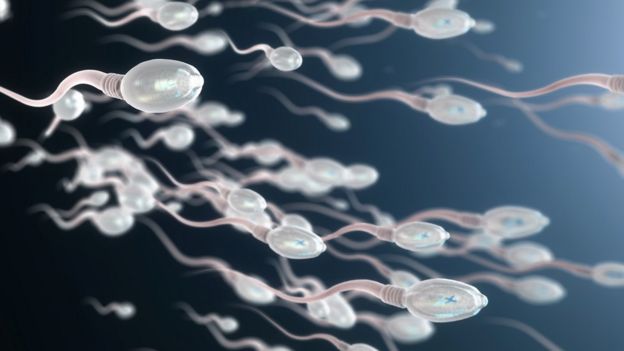
Audio By Carbonatix
Eating nuts regularly could improve sperm health, a study suggests.
Men who ate about two handfuls of mixed almonds, hazelnuts and walnuts daily for 14 weeks improved their sperm count and had more viable "swimmers", scientists found.
The study comes amid a decline in sperm counts across the Western world, linked to pollution, smoking and diet.
Researchers said there was growing evidence a healthy diet could boost the odds of conceiving.
About one in seven couples have difficulty getting pregnant and about 40-50% of cases of infertility are attributable to men.
The scientists randomly divided 119 healthy men between the ages of 18 and 35 into two groups:
- One added 60 grams (2oz) of nuts a day to their normal diet
- One made no changes to what they ate

Those in the nut group improved sperm:
- count by 14%
- vitality by 4%
- motility (movement) by 6%
- morphology (shape and size) by 1%
All of these are the parameters the World Health Organization lists as measurements of sperm quality and are associated with male fertility.
Experts said the study backed up others that showed a diet rich in omega-3 fatty acids, antioxidants and the B vitamin folate improved fertility.
Nuts contain many of these and other nutrients.
"Evidence is accumulating in the literature that healthy lifestyle changes such as following a healthy dietary pattern might help conception," said Dr Albert Salas-Huetos, from the Universitat Rovira i Virgili, in Spain, who led the study.
'Interesting academically'
However, researchers cautioned that these men were healthy and apparently fertile, so it was not clear whether the findings would apply to the wider population, including men with fertility problems.
Allan Pacey, professor of andrology at the University of Sheffield, who was not involved in the research, said it was also possible that men in the nut group might have made other positive changes to their lives not taken into account by the study.
Dr Virginia Bolton, formerly consultant clinical embryologist at Guy's Hospital in London, said the findings were "interesting academically" but it was impossible to say what effect they would have in terms of boosting the chances of pregnancy.
She added: "But meanwhile, until we get the answers to the questions, we should all be encouraging all of our patients to stop drinking alcohol, stop smoking, eat healthily, all of the standard things."
The results of the study are being presented at the annual meeting of the European Society of Human Reproduction and Embryology in Barcelona.
Latest Stories
-
GRA locks up Osu’s Cloud 9 Pub over non-payment of taxes
5 minutes -
GPL 25/26: Hearts pip Nations to return to winning ways
27 minutes -
GES dismisses claims of ‘secret recruitment’ and bribery allegations
38 minutes -
UTNMG condemns alleged financial exploitation at Bolgatanga Nurses’ Training College
48 minutes -
Ghana Prisons Service launches ‘Think Prison 360 Degrees’ initiative in Eastern Region
50 minutes -
He was a legend – NPP pays tribute to Daddy Lumba
1 hour -
President Mahama arrives in Nigeria for 68th ECOWAS Heads of State Summit
1 hour -
One dead, 3 injured in Juaboso-Bonsu Nkwanta road accident
1 hour -
Awerco Construction denies claims World Bank cancelled Weija Paediatric hospital contract
2 hours -
Photos: Ghana Prisons Service launches “Think Prison 360 Degrees” initiative
2 hours -
Daddy Lumba: Brisk business as fans defy rains to honour highlife legend
2 hours -
Fans defy heavy rains to celebrate life and music of Daddy Lumba
3 hours -
‘I won’t let their venom stain the memory of what we wore’ – Odo Broni’s pays tribute to late husband
3 hours -
Jospong Group braves morning rains to win souls for Christ
3 hours -
Livestream: Joy FM Nine Lessons and Carols underway at Labadi Beach
4 hours

